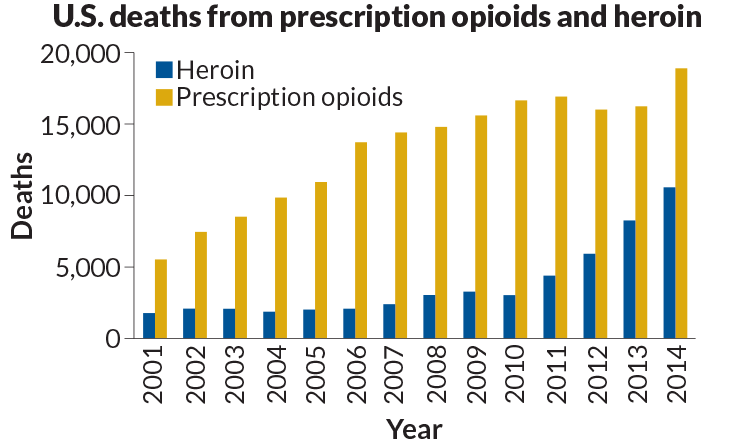In a recent press briefing, Press Secretary Secretary, Sean Spicer, reiterated support for medical marijuana, while suggesting the Feds may step up anti-cannabis enforcement (in states allowing adult-use recreational marijuana). His statement appeared to link recreational cannabis to the opioid crisis.
Spicer said:
"There's a big difference between that and recreational marijuana. I think that when you see the opioid addiction crisis blossoming in so many states around this country, the last thing we should be doing is encouraging people. There is still a federal law we need to abide by in terms of when it comes to recreational marijuana."
We applaud Press Secretary Sean Spicer for echoing President Trump’s statements on the campaign trail (re: medical marijuana). And, while we’re neutral on recreational adult-use, we feel it’s important to correct the record on one major point — linking recreational marijuana to the opioid addiction.
Contrary to popular misconception, no credible research suggests a causal link between cannabis and opioid abuse. In fact, the one consistent link that study after study has demonstrated is that increased access to legal cannabis reduces opioid abuse. In fact, many individuals use cannabis as an “exit drug” (not a “gateway drug”) to get off of opioids.
Consider the evidence:
Opioid Overdose Death Rates Are Nearly 25% Lower in Medical Marijuana States
After implementing medical marijuana programs, states with medical marijuana programs experience a significant drop in fatal opioid overdoses. States with medical marijuana programs have (on average) a 24.8 percent lower annual opioid overdose mortality rate than states without safe access to medical marijuana.
Declines in Fatal Opioid Overdoses Strengthen Over Time
In the first year following implementation, deaths decreased by 20 percent. The decline grew to 33.7% five years after implementation.
(Source: The multi-institutional study, Medical Cannabis Associated With Decreased Opiate Medication Use in Retrospective Cross-Sectional Survey of Chronic Pain Patients, published in JAMA Internal Medicine and led by researchers at the Perelman School of Medicine at the University of Pennsylvania, analyzed data in the 13 states allowing medical marijuana between 1999 and 2010.)
Admissions to Opioid-Related Treatment Programs Decrease 20% In MMJ States
States with legal clinical cannabis experience a 20% reduction in opioid-related substance abuse treatment admissions following implementation of medical marijuana programs. According to the study’s authors:
“Our results are intriguing in that we find fairly strong and consistent evidence using difference-in-differences, event study, and synthetic control group methods that states providing legal access to marijuana through dispensaries experience lower treatment admissions for addiction to pain medications.”
Adding...
“[T]he reduction in nonmedical use suggests that nonmedical [opioid] users are switching to medical marijuana when dispensaries are available.”
The authors conclude:
“We provide complementary evidence that dispensary provisions also reduce deaths related to opioid overdoses...We estimate even larger effects in states that have both legally protected and active dispensaries.”
(Source: "Do Medical Marijuana Laws Reduce Addiction and Deaths Related to Pain Killers?" Powell, David, Rosalie Pacula, and Mireille Jacobson. RAND BING Center for Health Economics (2015)
Cannabis Can Be An Effective Adjunct to Pain Therapy

Other studies suggest chronic pain patients experience superior clinical outcomes with clinical cannabis. A University of Michigan study, published in the Journal of Pain, concludes:
- Patients Reduce Opioid Intake: Cannabis use was associated with 64% lower opioid use in patients with chronic pain.
- Improved Quality of Life: Cannabis use was associated with better quality of life in patients with chronic pain.
- Fewer Side Effects: Cannabis use was associated with fewer medication side effects and medications used.
Dr. Daniel Clauw, one of the study’s researchers and a professor of pain management anesthesiology at the University of Michigan Medical School, observes:
“We are learning that the higher the dose of opioids people are taking, the higher the risk of death from overdose. This magnitude of reduction in our study [owing to medical marijuana] is significant enough to affect an individual’s risk of accidental death from overdose.”
(Source: "Medical Cannabis Use Is Associated With Decreased Opiate Medication Use in a Retrospective Cross-Sectional Survey of Patients With Chronic Pain." Boehnke, Kevin F., Evangelos Litinas, and Daniel J. Clauw. The Journal of Pain 17.6 (2016): 739-44. Web.)
The Opioid Epidemic

To say the the opioid epidemic has surged in recent years, would be an hug understatement! Fatal drug overdoses nearly tripled between 1999 and 2014. (Accounting for 60.9% of fatal overdoses, opioids are fueling the epidemic.) With a fatal overdose rate in the U.S. of 16.3 per 100,000 people, accidental drug deaths eclipse gun-related homicide rates by more than 5 ½ times!
Predictably, the rise in fatalities has mirrored the dramatic increase in doctor-prescribed opioid prescriptions. Clearly, the magnitude of the crisis warrants new thinking.
“Given the epidemic level of opioid overdoses, it is evident that more physicians should consider prescribing cannabis as part of their therapeutic protocol. Not to, would be irresponsible, unscientific, and unethical” — Dr. Michael Hart
The evidence is clear: Many individuals — when given the option — will choose cannabis over opioids. We currently embrace “substitution therapy” for heroin addicts — replacing heroin with methadone. However, methadone is suitable only for serious heroin addicts. Moreover, methadone is, itself, highly addictive and potentially fatal.
Given the relative safety profile of cannabis compared to opioids (fatal cannabis overdoses are essentially non-existent), coupled with the clinical efficacy of cannabis to treat chronic pain, isn’t it high time we give cannabis more serious consideration as a tool to combat the opioid crisis?

